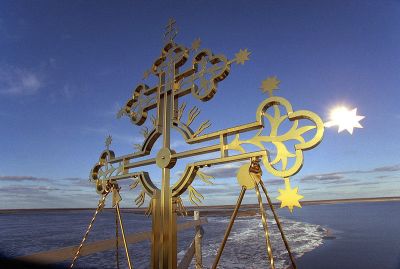|
From 'Orthodoxy and the World' www.pravmir.com Liturgical Life Source: Holy Cross Orthodox Church
“Behold, now is the favorable time; behold, now is the day of salvation.” 2 Cor. 6:2 “Oh come, let us sing to the Lord; let us make a joyful noise to the rock of our salvation! Let us come into his presence with thanksgiving; let us make a joyful noise to him with songs of praise! Oh come, let us worship and bow down; let us kneel before the Lord , our maker!” Ps. 94:1,2,6
Why do we go to Church? Why make an effort to attend the services and stand for long periods of time? Certainly there are more entertaining ways to spend a Sunday morning. What is it about our worship particularly that gives one a reason to "go to Church?" We have been given an incredible legacy of beautiful services that celebrate the sanctification of time. Each year we journey through the cycle of the Church year in order to enter in to the reality of the events commemorated. The Greek word for symbol means just that - "to bring together." We remember these events in the present. There is a technical word in the Greek for this "remembrance" - anamnesis. This word denotes much more than recalling an event from the past, it is a remembrance that brings the event into the present. It is a participation in the event in the present. Many of the hymns for each feast and service begin with the word "Today..." This is the sanctification of the present day in order for us to participate in the reality of what we are commemorating. This is seen in our Divine Liturgy where we thank God for the "cross, the tomb, the resurrection on the third day, the ascension into heaven, and His second and glorious coming." We are "remembering" events from the past and the future at the same time. This sanctification can only happen in its fulness in the life of the Church - the gathered community with the priest around the altar upon which the Gospel, which is Christ, is present. Fr. Alexander Schmemann states, "We can only worship in time, yet it is worship that ultimately not only reveals the meaning of time, but truly 'renews' time itself. There is no worship without the participation of the body, without words and silence, light and darkness, movement and stillness - yet it is in and through worship that all these essential expressions of man in his relation to the world are given their ultimate 'term' of reference, revealed in their highest and deepest meaning." Our worship is our real participation in the future Kingdom. We begin every Divine Liturgy with the words. "Blessed is the Kingdom..." It is in and through our leitourgia, our liturgical work, that we enter into and experience this world as encounter, an encounter with Christ in the midst of "our time." The secularism in our culture works against this idea of all of creation as epiphany. Secularism is the denial of worship. Symbols are reduced to a means of communicating relevant ideas in order to convince or sell something to someone. Symbols become mere illustrations rather than something that "makes present" a reality. There is a strong preoccupation with "relevant" worship and "relevant" churches. This has led to an implosion of worship. Worship has become so individual centered and consumer driven. One goes to Church in order to "get something out of it for myself." All of worship is to be grounded in the Incarnation of our Lord. He who became matter for our sakes, now invites us to participate in Him through matter. All of creation becomes an epiphany, a manifestation of God to us. Worship is epiphany, it is our tangible experience of the love and mercy of God. Again Fr. Schmemann says, "Being an epiphany of God, worship is thus the epiphany of the world; being communion with God, it is the only true communion with the world; being knowledge of God, it is the ultimate fulfillment of all human knowledge." This is why we place such a strong emphasis on our liturgical worship and try to do everything with a spirit of excellence. This is how our worship is "relevant." It reveals to us who God is, and we participate in Him through matter. Now the world becomes transparent, enabling us to see a glimpse of the Glory of God, rather than opaque, reduced to colorful rites and ceremonies at best, or worldly entertainment at worst. It is vital for us to catch a vision for this, so that we may know why it is we come to Church. It is not to understand God deeper, or to feel better about ourselves. Church is not an aesthetic experience, or a psychological boost. We don't come to Church to "get" anything. We come in order to participate in the joy of the Kingdom of God. This Kingdom is "made present" in our worship. "The Liturgy, we may say, is something that happens to us," says Fr. Schmemann. It is our entrance into the Kingdom, our participation in the eternal worship around God's throne in the heavens. May God help us to "see" our worship as a participation in the future kingdom surrounded by angels and archangels who unceasingly praise and glorify Him.
© Copyright 2004 by 'Orthodoxy and the World' www.pravmir.com |
